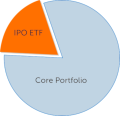The IPO market appears to be following broader market trends and has showed signs of marked improvement in both volume and performance over the past few weeks. Eight deals are expected to go public this week, seven of which are slated for the night of Wednesday, April 21st; if all seven are successfully completed, it will be the busiest day for IPOs in more than three years. Wednesday's group comprises an interesting mix of companies, from seismic data provider Global Geophysical Services (GGS) and ophthalmic disease-focused biotech Alimera Sciences (ALIM) to biocatalyst developer Codexis (CDXS) and speech generating device creator DynaVox (DVOX). After last month's tech wave, this group should provide a good proxy for investor interest in a more diverse collection of offerings.
Excluding this week's eight deals, there are twelve additional companies that have disclosed terms for their upcoming IPOs, suggesting that the recent uptick may be sustainable. In addition to increased levels of activity on our upcoming IPO calendar, there has also been a flurry of new filings: eleven companies entered the pipeline last week and plan to raise an aggregate of up to $3.5 billion. It was the highest number of IPO filings since the week of September 10th, 2007, when twelve companies filed for an IPO (seven later withdrew).
Four out of last week's eleven were tech companies, indicating March's surge in this sector may be positioned to continue. The group included the highly anticipated NXP Semiconductors (NXP), a Dutch chip company owned by KKR and Bain Capital, that filed to raise up to $1.2 billion and would be the biggest IPO since Verisk Analytics' (VRSK) $2.2 billion offering in October 2009. Other companies of note that filed last week include Codexis peer Amryis Biotechnologies (AMRS), which genetically modifies yeast strains to generate industrial synthetics, rare earth oxide producer Molycorp (MCP) and Fleetcor Technologies (FCT), which provides electronic payment cards to commercial fleets and oil companies.
*IPO data excludes SPACs.


